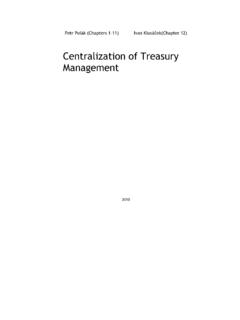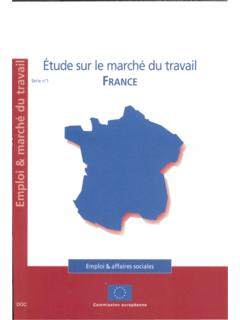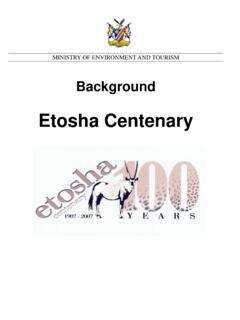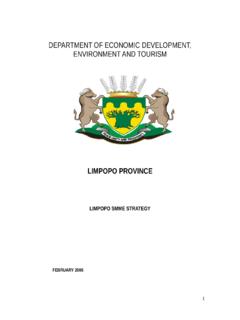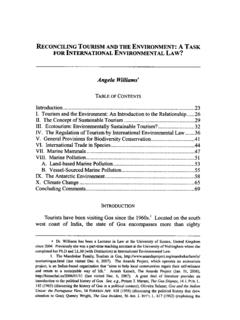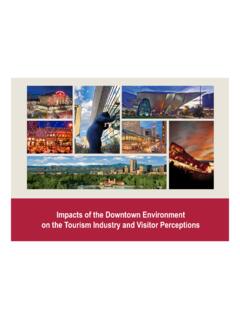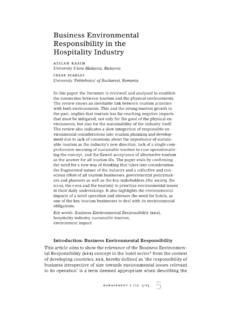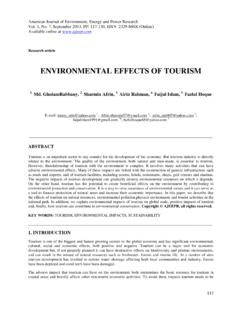Transcription of TAKING ACCOUNT OF ENVIRONMENT IN TOURISM …
1 COMMISSION OF THE EUROPEAN COMMUNITIES DIRECTORATE-GENERAL XXIII- TOURISM UNIT STUDIES ~~ {. : I I. TAKING ACCOUNT OF ENVIRONMENT IN TOURISM DEVELOPMENT DOCUMENT 1993 This document has been prepared for use within the Commission. It does not necessarily represent the Commission's official position. Cataloguing data can be found at the end of this publication. Luxembourg: Office for Official Publications of the European Communities, 1994 ISBN 92-826-6501-1 ECSC-EEC-EAEC, Brussels Luxembourg, 1994 Reproduction is authorized, except for commercial purposes, provided the source is acknowledged. Printed in Belgium Commission of the European Communities , ' D. G. XXIII TOURISM Unit TAKING ACCOUNT OF ENVIRONMENT ,-IN TOURISM DEVELOPMENT 1993 ECONSTAT ~ ~.}
2 , -;-;; 1 cr 7 c c:: ,_ ---This final report has been carried out by a research group of Econstat composed by: -Stefano Dall'Aglio (project coordinator) - Gilberto Zangari - Giorgio Pirre - Giancarlo Gasperoni (field researches coordinator) -Isabella Malagoli (data management) This report and the outcomes of the research are due to the common analysis and discussion. A central support for the completion of this study has been given by the professionals who have conducted the analysis of the case histories in different countries (see the annexes of the study): -G. Gardner Smith (case history: Eastbourne, UK) -A. Annyfanti(case history: Corfu, Greece) -C. Altes (case history: Lloret de Mar, Spain) -P.
3 Borjan (case history: Knokke Heist, Belgium) -J. Capella Hereu (case history: L'Estartit, Spain) -P. Paolinelli (case history: Costa Gallura/Costa Smeralda, Italy) -G. Zangari (case history:Rimini, Italy) 2 INDEX 1. Foreword .. 4 2. Research Methodology .. 6 Introduction .. 6 Working Philosophy .. 8 Objectives .. 9 Methodology of Research Project .. 10 3. Presentation of the Case Histories .. 14 4. The Effect of TOURISM Development on the ENVIRONMENT .. 17 Introduction .. 17 The Natural ENVIRONMENT .. 19 The Socio-Cultural ENVIRONMENT .. 22 The Urban ENVIRONMENT .. 2> Changes in the ENVIRONMENT which Affect TOURISM Competitivity .. ~ Concluding Remarks.
4 :J> 5. Prominent Actors in the Relationship Between TOURISM and ENVIRONMENT .. 33 Introduction .. 33 Supply and Demand Tourist Operators .. 34 Local Government Bodies .. 38 The Local Population and Organized Groups .. 40 Basic Results of the Surveys on Host Population .. 42 Interactions Between the Actors .. 49 5. 7. The Interactions in the Sub-Environments .. 57 6. ENVIRONMENT and Competitiveness .. 59 Actions in Favour of the ENVIRONMENT .. 59 Projects to Regain Competitiveness .. m 7. The TOURISM / ENVIRONMENT Relations System .. 00 7 .1. Interpretative Models of the Relationships Between TOURISM and ENVIRONMENT .. 00 A Reconsideration of TOURISM / ENVIRONMENT Relations.
5 73 7 .3. Other Factors which Influence the System .. 79 8. Recommendations for the Action .. 84 Local/Regional Objectives .. 85 Objectives at National/European Community level.. m 3 TAKING ACCOUNT OF ENVIRONMENT IN TOURISM DEVELOPMENT !.FOREWORD TOURISM activity, more than other economic sectors, uses environmental resources as main inputs into its "production function". For the most part, such resources are non-reproducible and play a fundamental role in determining a destination' appeal to tourists; but their use and modifications also have decisive impact on an area's social and economic development beyond its prospects as a TOURISM product. In accordance with the OECD report --L 'impact du Tourisme sur [' ENVIRONMENT , 1980 --the environmental resources which most need special attention are: 1.]
6 Acquatic milieu (streams and rivers, seas, coastlines and coastal waters, water fauna and flora); 2. natural milieu (soil, forest fauna and flora, landscapes, air); 3. architectural milieu (man-made constructions, which attract tourists because of their peculiarity); 4. human milieu (human activities, which can be experienced independently from their objective or the context in which they are carried out). This notion of ENVIRONMENT was still limited to meanings linked to "relevance for tourists". The last two points were emphasized solely for the aspects perceived by tourists, whereas no mention is made of internal aspects, invisible to the tourist but of extreme importance for the local area's growth and the success of TOURISM investments (in terms of social tension, labour market, property and land values, etc.)
7 Therefore, we are currently led to define ' ENVIRONMENT ' as that vast array of factors which represent external (dis-)economies of a TOURISM resort: natural (air, water, soil, wildlife, climate), anthropological, economic, social, cultural, historical, architectural and infrastructural factors which represent a habitat onto which TOURISM activities are grafted and which is thereby exploited and changed by the exercise of TOURISM business. In this broad sense, environmental consciousness of tourist demand is growing fast and has become one of the prime determinants of holiday travel destination choice. Today, such "environmental motivations" of the tourist - which are also the TOURISM entrepreneur's "economic motivation" -has rendered private operators (local hoteliers, ground operators, tour operators), local and national authorities, and even the local community more aware of and sensitive to the problem.
8 All these actors are more conscious than in the past about the opportunity of protecting the ENVIRONMENT in which TOURISM activities take place: the safeguarding of the ENVIRONMENT and its balance is a necessary condition for mid-and long-term TOURISM growth. 4 At the same time, the market success or failure of a TOURISM destination ends up returning considerable feedback to the surrounding ENVIRONMENT in terms of "signs" on the territory, impacts on nature, modification of social, cultural and economic conditions. As the WTOIUNEP report (1983) indicates, these effects can even be beneficial in that tourist spending may engender an economic motivation in favour of environmental preservation.
9 The determination of the relationships between the environmental situation and the appeal of a TOURISM destination is therefore the priority goal of this study. The proposal deals with both the effects on the ENVIRONMENT caused by the TOURISM development and the effects of the environmental situation on the competitiveness of the resort. These two relationships interact with each other, too often in a vicious circle, and end up determining the resort success or failure on the market and, in the ultimate analysis, the debasement or the upgrading of the local ENVIRONMENT . Of course, one must distinguish between short-term effects and mid-long term effects, the latter usually being more pervasive as well as more difficult to recognize and control.
10 As a recent study has underlined (Econstat. TOURISM and Environmental Crises: the Impact of Algae on Summer Holidays along the Adriatic Riviera in 1989, Esomar, 1991), to a certain extent (and in specific cases) in the short term the environmental crises can be counterbalanced by a good combination of good TOURISM factors (service quality, variety of leisure activities, artificial equipmen, hospitality, competitive prices .. ), while the long-term crisis poses a serious challenge to the livelihood of the local TOURISM industry. The TOURISM industry must become more aware of the environmental factor and is able to do so by preparing and implementing effective solutions in the management of resources both internal to the development projects and external to them.

